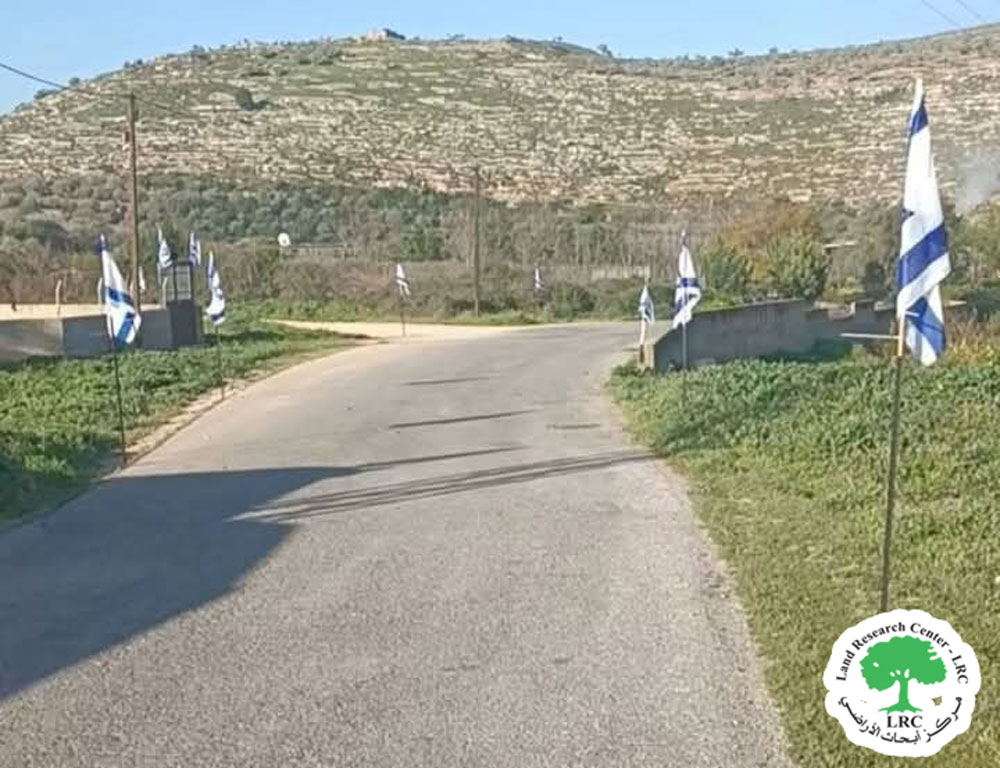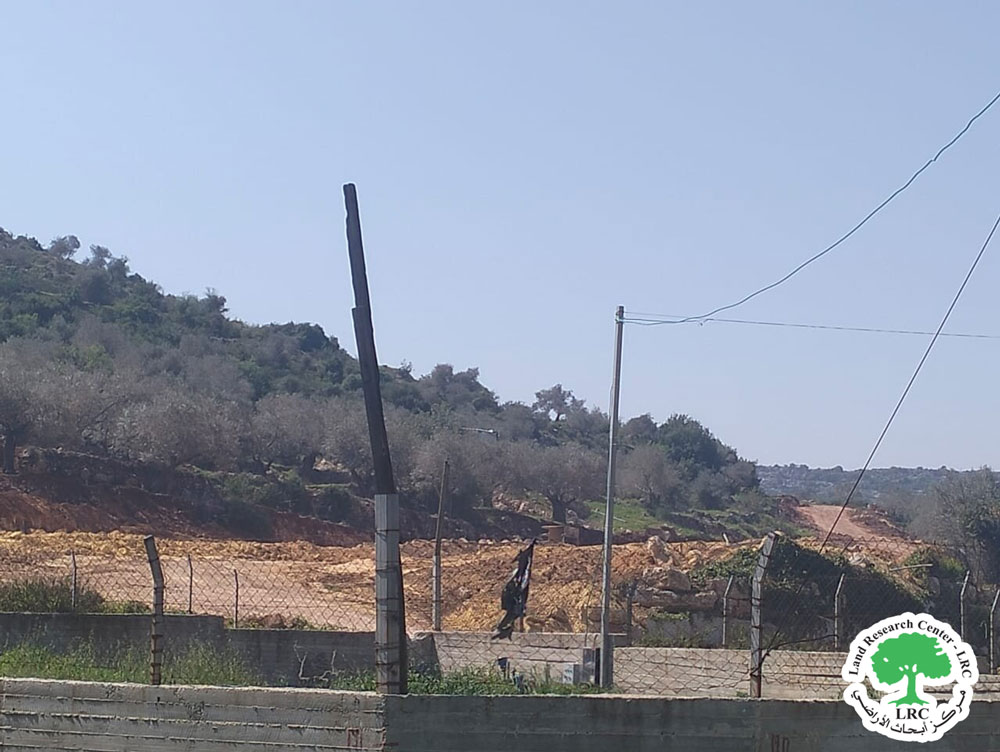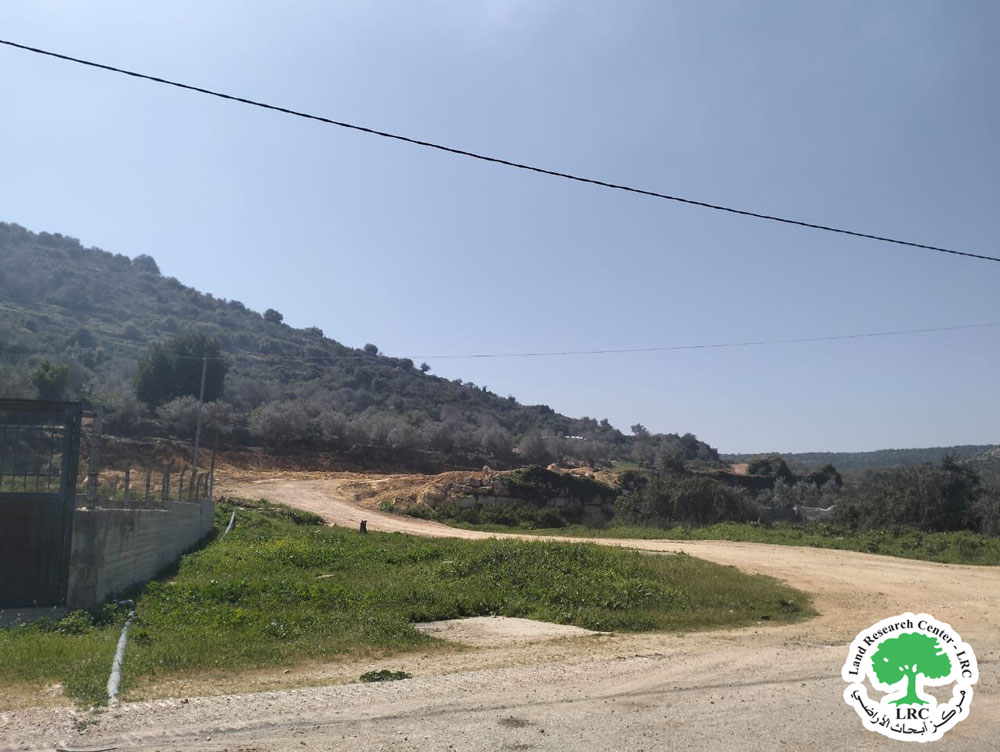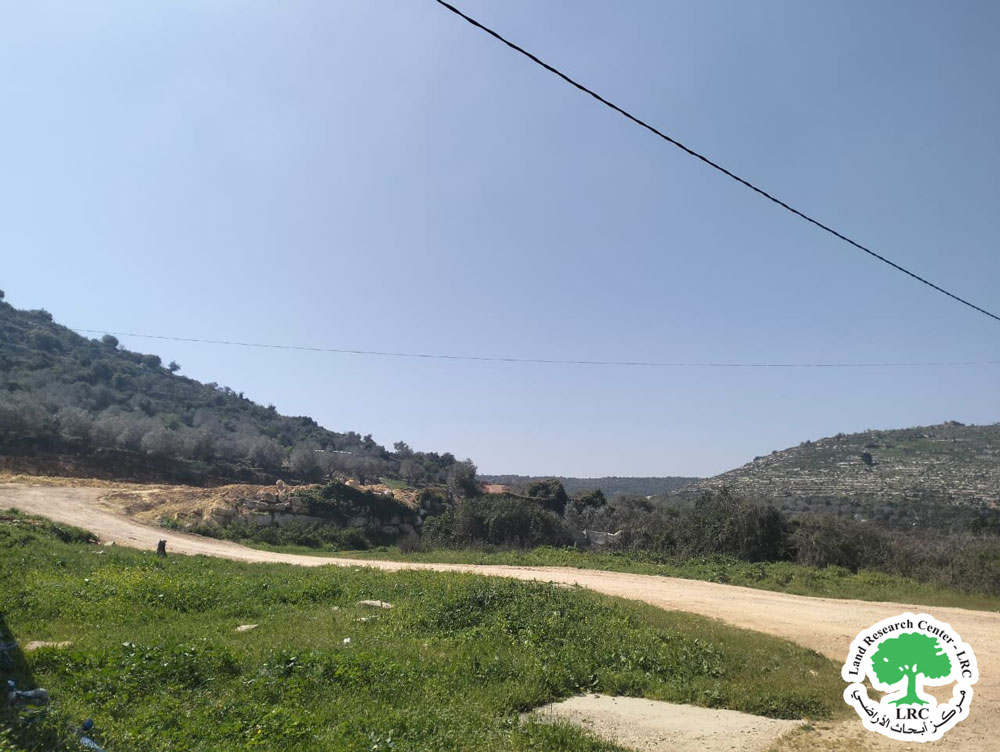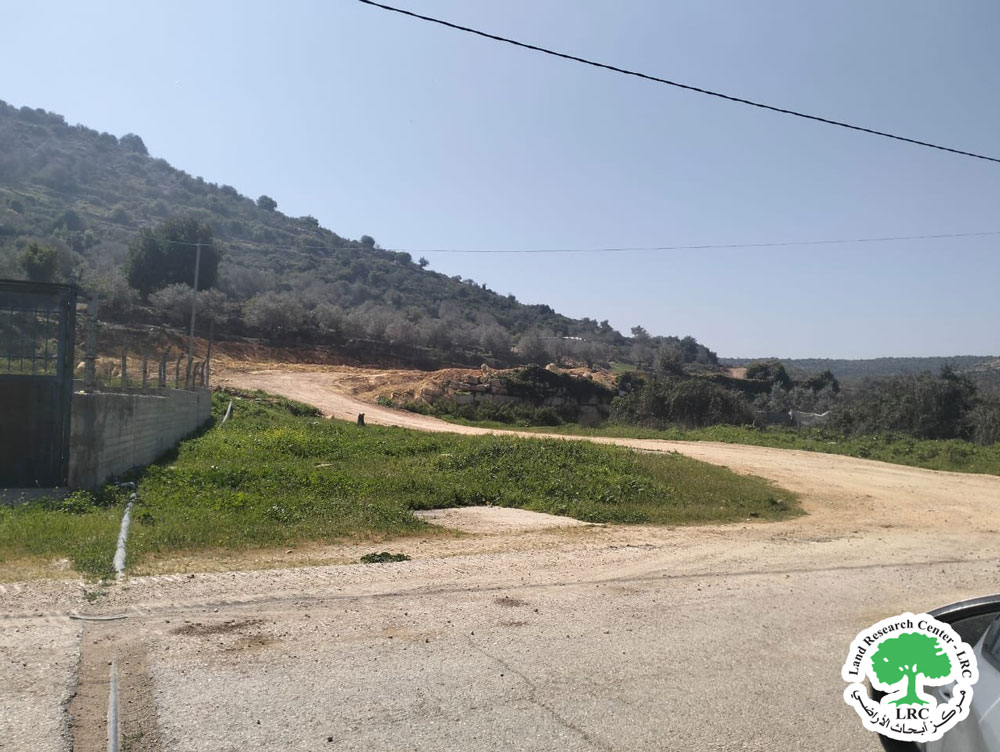Settlers Bulldoze Agricultural Lands and Uproot 29 Olive Trees to Expand a Settlement Road in Wad Al Matwi Area West of Salfit
- Violation: Proceeding with the expansion of a linked settlement road's right-of-way.
- Location: Farkhah Village and Wad Al Matwi area west of Salfit city.
- Date of Violation: 16/03/2025.
- Perpetrating Party: A group of settlers.
- Affected Party: Several farmers from the region
Details of the Violation:
For the second consecutive day, the settlers' machinery continues to bulldoze citizens' lands to expand the colonial road corridor. This road connects the newly established pastoral outpost in the Al-Batin area on the lands of Farkha village, passing through Wadi Al Matwi and reaching the Al Matwi water spring, spanning a length of two kilometers.
According to on-site monitoring of the violation, a group of settlers brought in three civilian bulldozers belonging to them and began expanding the colonial road corridor. So far, this has resulted in the uprooting of 29 olive trees and the leveling of three dunums of privately owned land belonging to several farmers.
The following table presents the details of the damages according to field monitoring:
Impacted Farmer | Family Number | Female Number | Children Number | Damaged Area Land | Number of uprooted trees |
Riyad Ezzat Zohd | 2 | 1 | 0 | 1 | 8 |
Zoher Ezzat Zohd | 4 | 2 | 0 | 1 | 10 |
Nafez Ayyoub Ali Ahmad | 3 | 2 | 0 | 1 | 11 |
Farmer Riyad Zahd stated to the researcher from the LRC:
“On Sunday morning, we were surprised to find that the settlers had resumed the expansion of the colonial road leading to the pastoral outpost in the village of Farkha. They brought in three civilian bulldozers and began the bulldozing of our agricultural lands without any prior notice or even a military order. The real danger is not just the bulldozing itself, but the fact that all our lands adjacent to the road are now entirely at risk and are practically confiscated by the settlers. This is truly heartbreaking, as these lands used to produce no less than ten tins of olive oil annually. Personally, I own 12 dunums of olive-planted land there, and due to these bulldozing operations and the settlers' presence in the area, it will become increasingly difficult to access and tend to these lands in the near future, especially with the escalation of settler attacks”.
It is worth noting that since October 2024, the Israeli occupation, in coordination with settlers and using bulldozers belonging to the Israeli Settlements Council, has begun developing this colonial road from the Al Matwi area, passing through Al-Batin on the lands of Farkha village. As part of this process, they seized the Farkha water spring under the pretext that part of the land is considered "state land" by the occupation authorities.
The initial bulldozing of this road began in 2023, during which the occupation laid the groundwork for establishing a new pastoral outpost in the area.
Legal Commentary:
The Palestinian environment, in general, is subjected to numerous environmental violations by the Israeli occupation, disregarding all international and national laws and conventions related to the protection of environmental rights. The right to live in a clean and healthy environment is a fundamental human right that has been inherent to mankind since the beginning of creation. The occupation often attempts to present itself as being concerned with international environmental issues, despite having signed major environmental protection agreements, such as the Basel Convention in 1989, the Rotterdam Convention in 2008, the Stockholm Convention in 2001, and the Ramsar Convention in 1971, as well as air quality and climate protocols. Nevertheless, Israel continues to violate all of these treaties without accountability or oversight.
In addition to the provisions regarding the right to enjoy a clean and healthy environment for all those under military occupation according to international laws, conventions, and treaties, such as the International Covenant on Economic, Social, and Cultural Rights, adopted by the United Nations General Assembly in Resolution 2200A (d-21) on December 16, 1966, in Article (1), paragraph (2): "...All peoples, in pursuit of their own objectives, have the right to freely dispose of their natural wealth and resources without prejudice to any obligations arising from the international economic cooperation based on the principle of mutual benefit and international law. In no case shall a people be deprived of its means of subsistence...".
Undoubtedly, the violations carried out by the Israeli occupation contradicts with the laws of the occupation state itself before any other laws. Referring to the details of this case, the Israeli Penal Code of 1977 and its amendments stipulate that trespassing on someone else's property to commit a criminal act punishable by law is an offense. By reading Article 452 of the Israeli Penal Code, we find that the law punishes those who commit an offense or cause damage to property such as (a water well, a water reservoir, a dam, a floodgate, planted trees, a bridge, a tank, or a water cistern) with a penalty of five years imprisonment.
In addition to, Article 447 of the Penal Code states: "Anyone who does any of the following with the intent to intimidate, insult, or harass the property owner or commit a crime shall be punished by imprisonment for two years:
(1) Enters or crosses the property;
(2) After entering the property legally, remains there unlawfully.
(b) A crime is committed under this section if the offender carries a firearm or a cold weapon, and the punishment is imprisonment for four years."
By reading the text of this article, we find that the Israeli Penal Code criminalizes the mere act of entering someone else's property without permission, with the intent to insult, harass, or intimidate, and punishes this act with two years of imprisonment. The punishment increases to four years if the offender commits any act on someone else's property using a weapon or a sharp tool, referred to as a "cold weapon." This is explicitly criminalized in the text of Article 447 of the aforementioned Israeli Penal Code. Additionally, a penalty of 5 years imprisonment is imposed on those who cause damage to property mentioned in Article 452. Therefore, the violator, the "settler," should face a compounded violation: the first for entering a property that is not theirs, and the second for trespassing on and cutting down the planted trees, resulting in environmental harm.
Therefore, the Israeli aggressor blatantly violates both international laws and treaties, as well as the internal laws of the "occupying state," in a clear violation. Consequently, the "Israeli judiciary" must hold the settlers accountable and punish them for these actions based on the provisions of their own laws. However, there is no legal accountability for the aggressors by the Israeli judiciary. Despite this, every human being on this earth has the right to live in a clean, healthy, and safe environment, free from any violation or aggression against it.
مشروع: حماية الحقوق البيئية الفلسطينية في مناطق "ج" SPERAC IV - FCDO
Disclaimer: The views and opinions expressed in this report are those of Land Research Center and do not necessarily reflect the views or positions of the project donor; the Norwegian Refugee Council.
إخلاء المسؤولية: الآراء ووجهات النظر الواردة في هذا التقرير هي آراء ووجهات نظر مركز أبحاث الأراضي ولا تعكس بالضرورة وجهات نظر أو مواقف الجهة المانحة للمشروع؛ المجلس النرويجي. للاجئين
